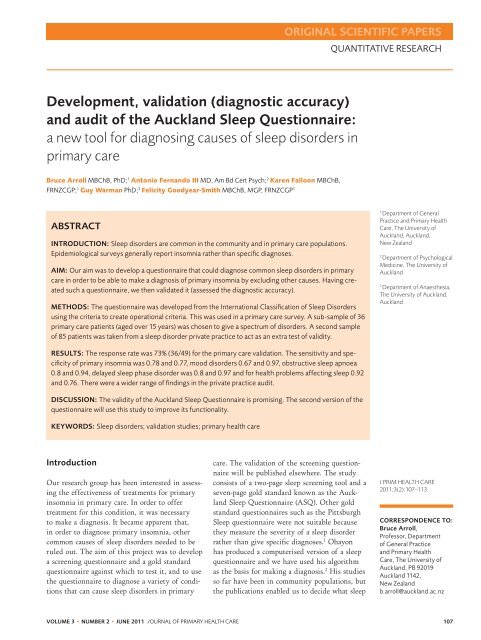single PDF of the entire issue - The Royal New Zealand College of ...
single PDF of the entire issue - The Royal New Zealand College of ...
single PDF of the entire issue - The Royal New Zealand College of ...
You also want an ePaper? Increase the reach of your titles
YUMPU automatically turns print PDFs into web optimized ePapers that Google loves.
ORIGINAL SCIENTIFIC PAPERS<br />
quantitative research<br />
Development, validation (diagnostic accuracy)<br />
and audit <strong>of</strong> <strong>the</strong> Auckland Sleep Questionnaire:<br />
a new tool for diagnosing causes <strong>of</strong> sleep disorders in<br />
primary care<br />
Bruce Arroll MBChB, PhD; 1 Antonio Fernando III MD, Am Bd Cert Psych; 2 Karen Falloon MBChB,<br />
FRNZCGP; 1 Guy Warman PhD; 3 Felicity Goodyear-Smith MBChB, MGP, FRNZCGP 1<br />
ABSTRACT<br />
Introduction: Sleep disorders are common in <strong>the</strong> community and in primary care populations.<br />
Epidemiological surveys generally report insomnia ra<strong>the</strong>r than specific diagnoses.<br />
Aim: Our aim was to develop a questionnaire that could diagnose common sleep disorders in primary<br />
care in order to be able to make a diagnosis <strong>of</strong> primary insomnia by excluding o<strong>the</strong>r causes. Having created<br />
such a questionnaire, we <strong>the</strong>n validated it (assessed <strong>the</strong> diagnostic accuracy).<br />
Methods: <strong>The</strong> questionnaire was developed from <strong>the</strong> International Classification <strong>of</strong> Sleep Disorders<br />
using <strong>the</strong> criteria to create operational criteria. This was used in a primary care survey. A sub-sample <strong>of</strong> 36<br />
primary care patients (aged over 15 years) was chosen to give a spectrum <strong>of</strong> disorders. A second sample<br />
<strong>of</strong> 85 patients was taken from a sleep disorder private practice to act as an extra test <strong>of</strong> validity.<br />
1<br />
Department <strong>of</strong> General<br />
Practice and Primary Health<br />
Care, <strong>The</strong> University <strong>of</strong><br />
Auckland, Auckland,<br />
<strong>New</strong> <strong>Zealand</strong><br />
2<br />
Department <strong>of</strong> Psychological<br />
Medicine, <strong>The</strong> University <strong>of</strong><br />
Auckland<br />
3<br />
Department <strong>of</strong> Anaes<strong>the</strong>sia,<br />
<strong>The</strong> University <strong>of</strong> Auckland,<br />
Auckland<br />
Results: <strong>The</strong> response rate was 73% (36/49) for <strong>the</strong> primary care validation. <strong>The</strong> sensitivity and specificity<br />
<strong>of</strong> primary insomnia was 0.78 and 0.77, mood disorders 0.67 and 0.97, obstructive sleep apnoea<br />
0.8 and 0.94, delayed sleep phase disorder was 0.8 and 0.97 and for health problems affecting sleep 0.92<br />
and 0.76. <strong>The</strong>re were a wider range <strong>of</strong> findings in <strong>the</strong> private practice audit.<br />
Discussion: <strong>The</strong> validity <strong>of</strong> <strong>the</strong> Auckland Sleep Questionnaire is promising. <strong>The</strong> second version <strong>of</strong> <strong>the</strong><br />
questionnaire will use this study to improve its functionality.<br />
Keywords: Sleep disorders; validation studies; primary health care<br />
Introduction<br />
Our research group has been interested in assessing<br />
<strong>the</strong> effectiveness <strong>of</strong> treatments for primary<br />
insomnia in primary care. In order to <strong>of</strong>fer<br />
treatment for this condition, it was necessary<br />
to make a diagnosis. It became apparent that,<br />
in order to diagnose primary insomnia, o<strong>the</strong>r<br />
common causes <strong>of</strong> sleep disorders needed to be<br />
ruled out. <strong>The</strong> aim <strong>of</strong> this project was to develop<br />
a screening questionnaire and a gold standard<br />
questionnaire against which to test it, and to use<br />
<strong>the</strong> questionnaire to diagnose a variety <strong>of</strong> conditions<br />
that can cause sleep disorders in primary<br />
care. <strong>The</strong> validation <strong>of</strong> <strong>the</strong> screening questionnaire<br />
will be published elsewhere. <strong>The</strong> study<br />
consists <strong>of</strong> a two-page sleep screening tool and a<br />
seven-page gold standard known as <strong>the</strong> Auckland<br />
Sleep Questionnaire (ASQ). O<strong>the</strong>r gold<br />
standard questionnaires such as <strong>the</strong> Pittsburgh<br />
Sleep questionnaire were not suitable because<br />
<strong>the</strong>y measure <strong>the</strong> severity <strong>of</strong> a sleep disorder<br />
ra<strong>the</strong>r than give specific diagnoses. 1 Ohayon<br />
has produced a computerised version <strong>of</strong> a sleep<br />
questionnaire and we have used his algorithm<br />
as <strong>the</strong> basis for making a diagnosis. 2 His studies<br />
so far have been in community populations, but<br />
<strong>the</strong> publications enabled us to decide what sleep<br />
J PRIM HEALTH CARE<br />
2011;3(2):107–113.<br />
Correspondence to:<br />
Bruce Arroll,<br />
Pr<strong>of</strong>essor, Department<br />
<strong>of</strong> General Practice<br />
and Primary Health<br />
Care, <strong>The</strong> University <strong>of</strong><br />
Auckland, PB 92019<br />
Auckland 1142,<br />
<strong>New</strong> <strong>Zealand</strong><br />
b.arroll@auckland.ac.nz<br />
VOLUME 3 • NUMBER 2 • JUNE 2011 J OURNAL OF PRIMARY HEALTH CARE 107

















